Unit 5 Why do you like pandas?同步导学精炼(知识点和语法点汇总)
文档属性
| 名称 | Unit 5 Why do you like pandas?同步导学精炼(知识点和语法点汇总) |
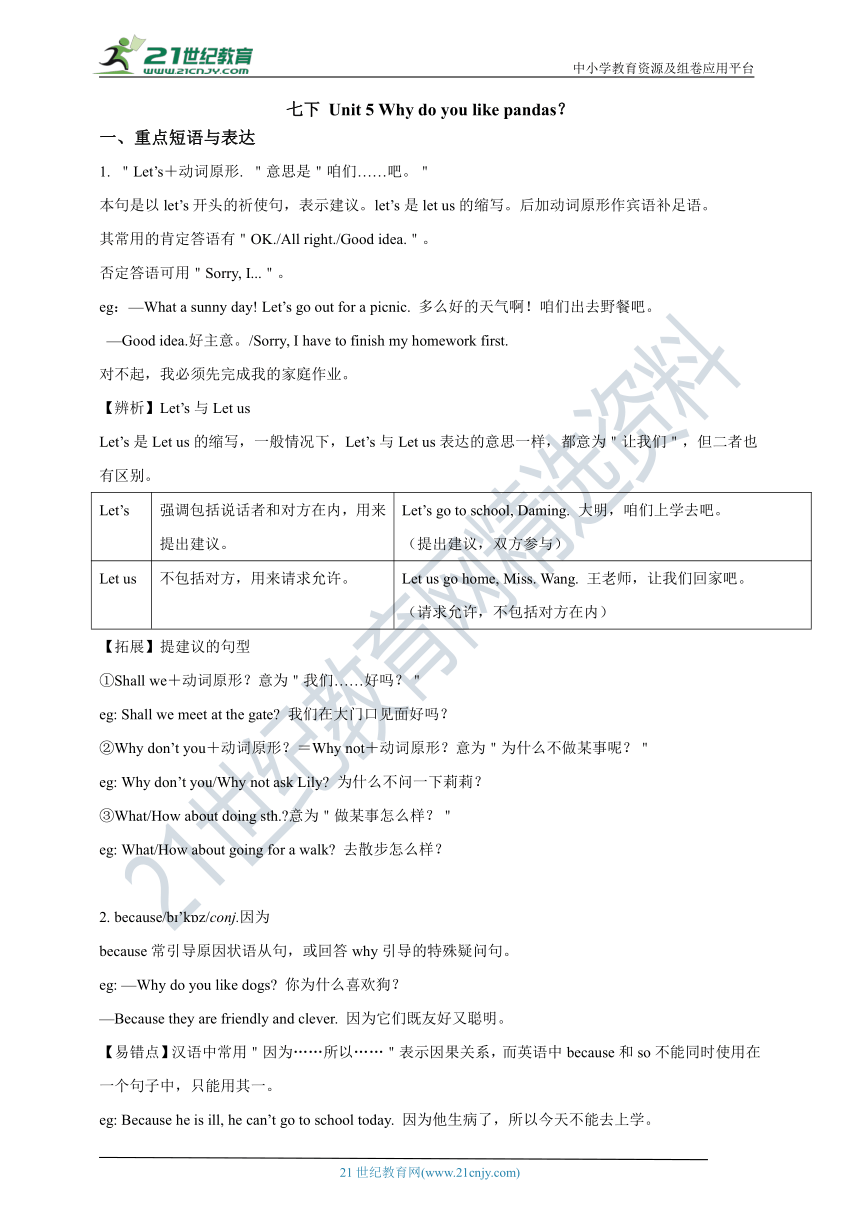
|
|
| 格式 | zip | ||
| 文件大小 | 1.5MB | ||
| 资源类型 | 试卷 | ||
| 版本资源 | 人教新目标(Go for it)版 | ||
| 科目 | 英语 | ||
| 更新时间 | 2021-03-08 00:00:00 | ||
图片预览

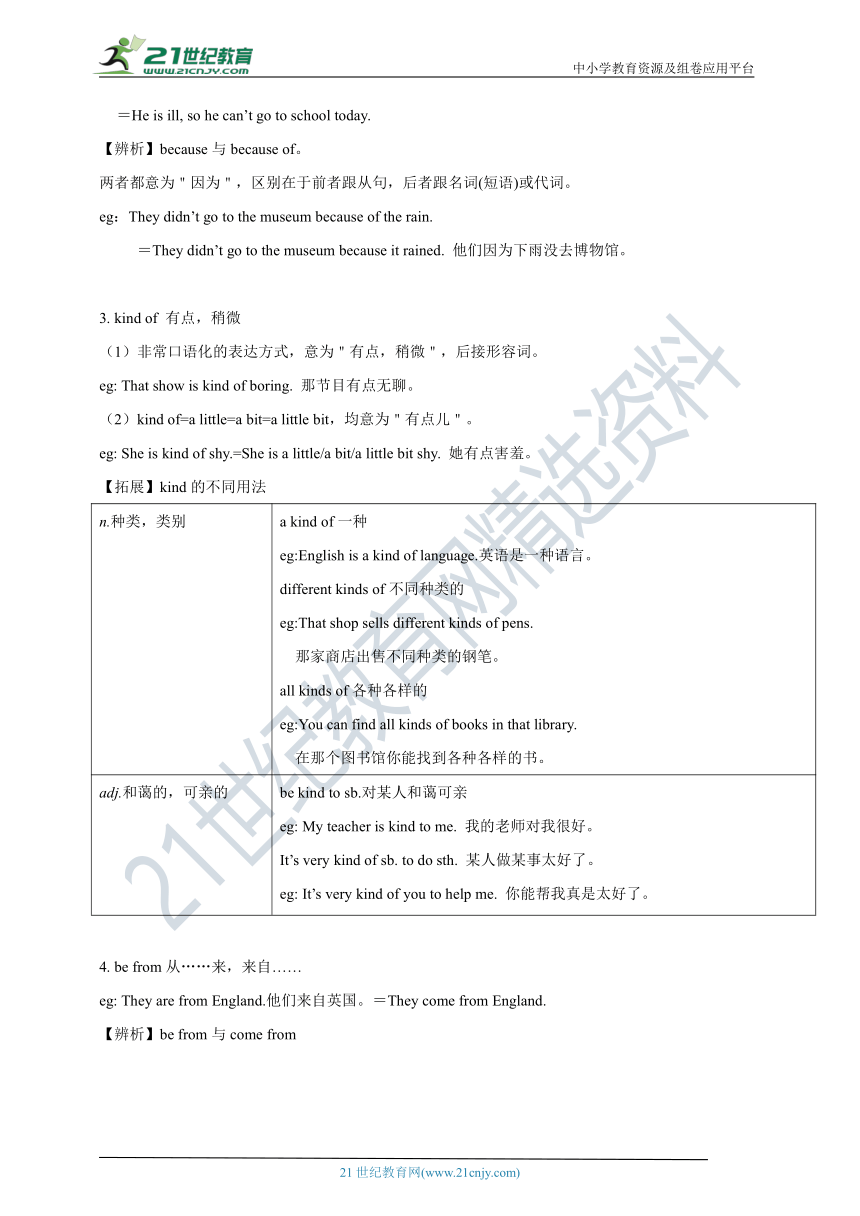
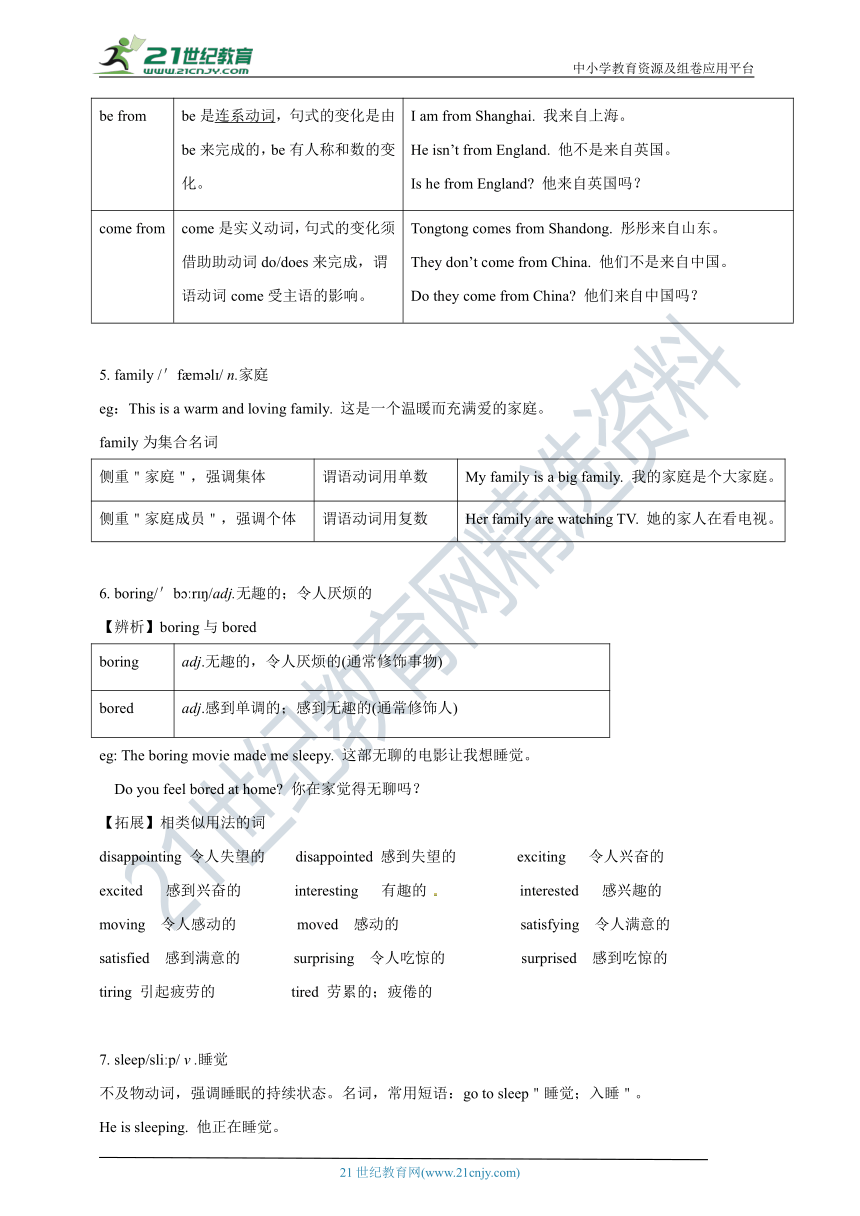
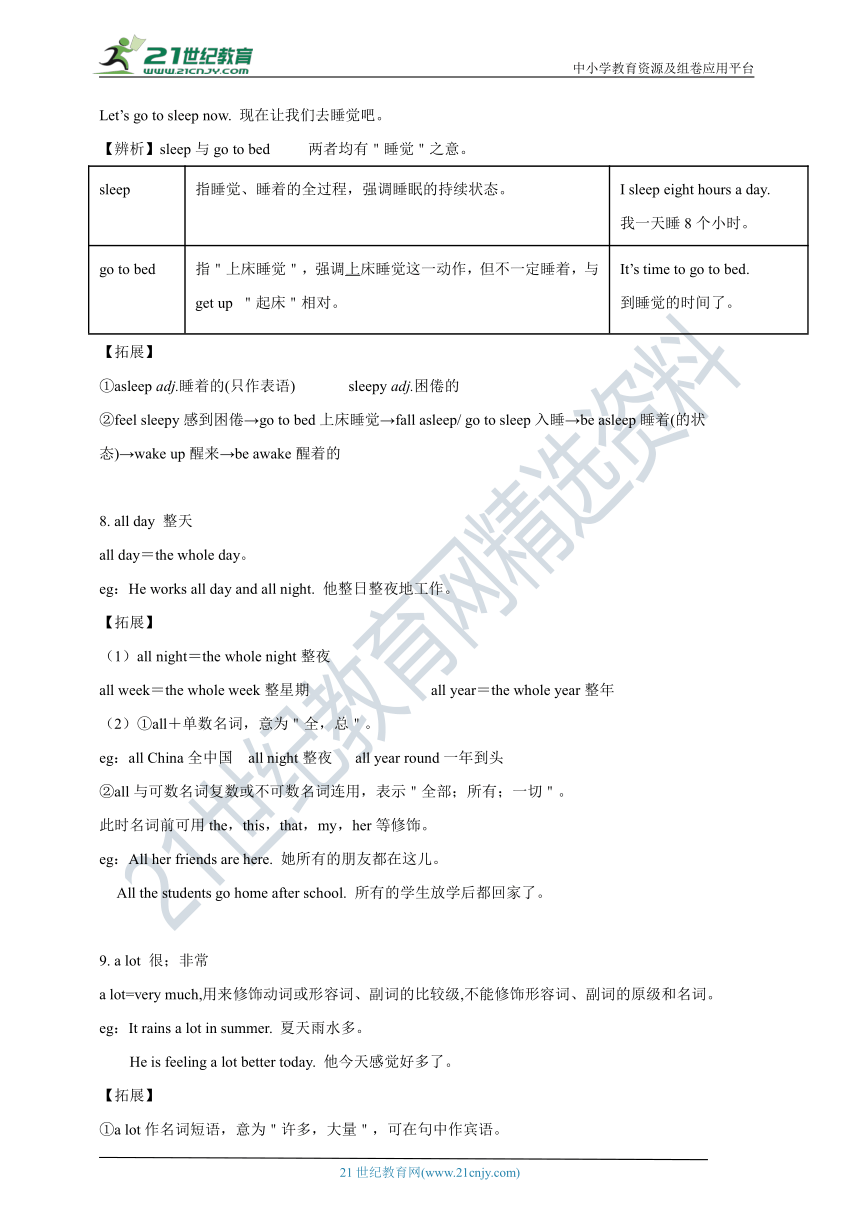
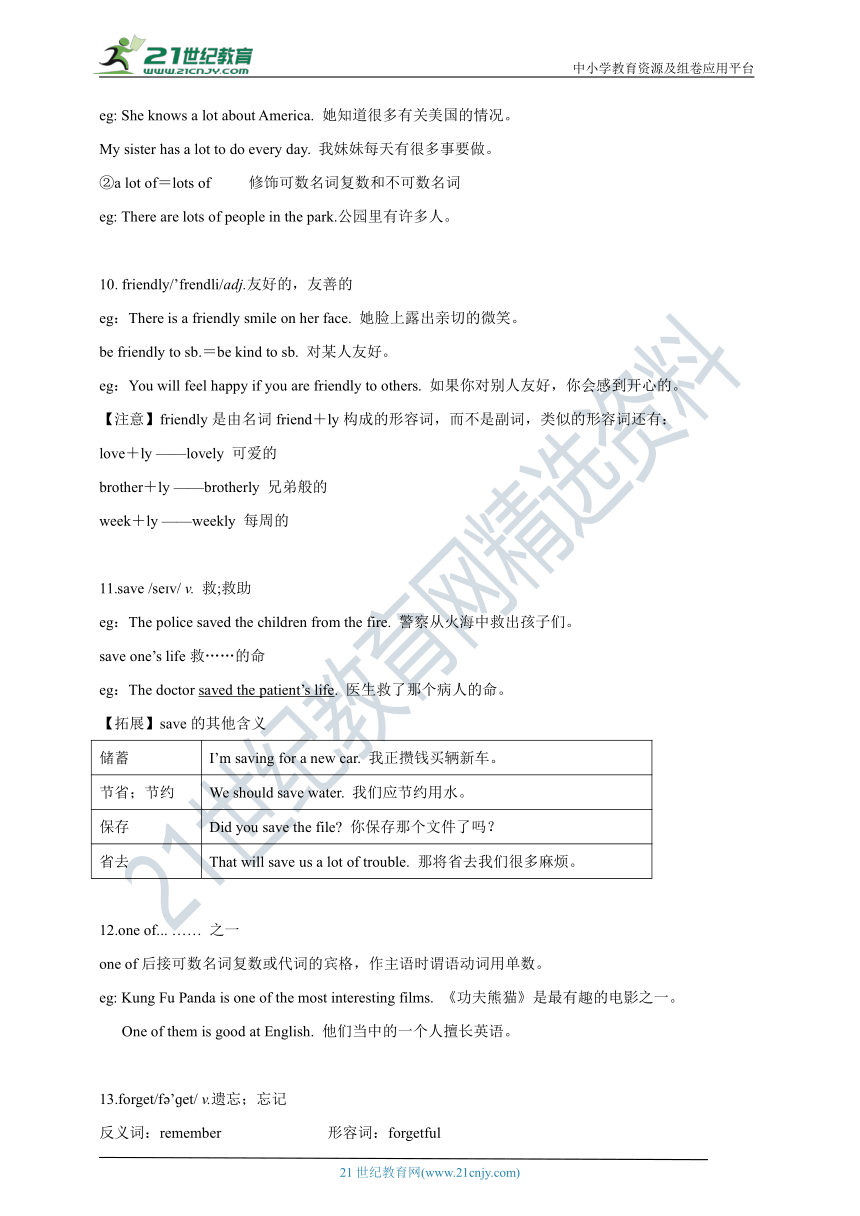
文档简介
中小学教育资源及组卷应用平台
七下
Unit
5
Why
do
you
like
pandas?
一、重点短语与表达
1.
"Let’s+动词原形.
"意思是"咱们……吧。"
本句是以let’s开头的祈使句,表示建议。let’s是let
us的缩写。后加动词原形作宾语补足语。
其常用的肯定答语有"OK./All
right./Good
idea."。
否定答语可用"Sorry,
I..."。
eg:—What
a
sunny
day!
Let’s
go
out
for
a
picnic.
多么好的天气啊!咱们出去野餐吧。
—Good
idea.好主意。/Sorry,
I
have
to
finish
my
homework
first.
对不起,我必须先完成我的家庭作业。
【辨析】Let’s与Let
us
Let’s是Let
us的缩写,一般情况下,Let’s与Let
us表达的意思一样,都意为"让我们",但二者也有区别。
Let’s
强调包括说话者和对方在内,用来提出建议。
Let’s
go
to
school,
Daming.
大明,咱们上学去吧。(提出建议,双方参与)
Let
us
不包括对方,用来请求允许。
Let
us
go
home,
Miss.
Wang.
王老师,让我们回家吧。(请求允许,不包括对方在内)
【拓展】提建议的句型
①Shall
we+动词原形?意为"我们……好吗?"
eg:
Shall
we
meet
at
the
gate?
我们在大门口见面好吗?
②Why
don’t
you+动词原形?=Why
not+动词原形?意为"为什么不做某事呢?"
eg:
Why
don’t
you/Why
not
ask
Lily?
为什么不问一下莉莉?
③What/How
about
doing
sth.?意为"做某事怎么样?"
eg:
What/How
about
going
for
a
walk?
去散步怎么样?
2.
because/b?’k?z/conj.因为
because常引导原因状语从句,或回答why引导的特殊疑问句。
eg:
—Why
do
you
like
dogs?
你为什么喜欢狗?
—Because
they
are
friendly
and
clever.
因为它们既友好又聪明。
【易错点】汉语中常用"因为……所以……"表示因果关系,而英语中because和so不能同时使用在一个句子中,只能用其一。
eg:
Because
he
is
ill,
he
can’t
go
to
school
today.
因为他生病了,所以今天不能去上学。
=He
is
ill,
so
he
can’t
go
to
school
today.
【辨析】because与because
of。
两者都意为"因为",区别在于前者跟从句,后者跟名词(短语)或代词。
eg:They
didn’t
go
to
the
museum
because
of
the
rain.
=They
didn’t
go
to
the
museum
because
it
rained.
他们因为下雨没去博物馆。
3.
kind
of
有点,稍微
(1)非常口语化的表达方式,意为"有点,稍微",后接形容词。
eg:
That
show
is
kind
of
boring.
那节目有点无聊。
(2)kind
of=a
little=a
bit=a
little
bit,均意为"有点儿"。
eg:
She
is
kind
of
shy.=She
is
a
little/a
bit/a
little
bit
shy.
她有点害羞。
【拓展】kind的不同用法
n.种类,类别
a
kind
of一种
eg:English
is
a
kind
of
language.英语是一种语言。
different
kinds
of不同种类的eg:That
shop
sells
different
kinds
of
pens.那家商店出售不同种类的钢笔。all
kinds
of各种各样的eg:You
can
find
all
kinds
of
books
in
that
library.
在那个图书馆你能找到各种各样的书。
adj.和蔼的,可亲的
be
kind
to
sb.对某人和蔼可亲eg:
My
teacher
is
kind
to
me.
我的老师对我很好。It’s
very
kind
of
sb.
to
do
sth.
某人做某事太好了。eg:
It’s
very
kind
of
you
to
help
me.
你能帮我真是太好了。
4.
be
from从……来,来自……
eg:
They
are
from
England.他们来自英国。=They
come
from
England.
【辨析】be
from与come
from
be
from
be是连系动词,句式的变化是由be来完成的,be有人称和数的变化。
I
am
from
Shanghai.
我来自上海。He
isn’t
from
England.
他不是来自英国。Is
he
from
England?
他来自英国吗?
come
from
come是实义动词,句式的变化须借助助动词do/does来完成,谓语动词come受主语的影响。
Tongtong
comes
from
Shandong.
彤彤来自山东。They
don’t
come
from
China.
他们不是来自中国。Do
they
come
from
China?
他们来自中国吗?
5.
family
/'f?m?l?/
n.家庭
eg:This
is
a
warm
and
loving
family.
这是一个温暖而充满爱的家庭。
family为集合名词
侧重"家庭",强调集体
谓语动词用单数
My
family
is
a
big
family.
我的家庭是个大家庭。
侧重"家庭成员",强调个体
谓语动词用复数
Her
family
are
watching
TV.
她的家人在看电视。
6.
boring/'b??r??/adj.无趣的;令人厌烦的
【辨析】boring与bored
boring
adj.无趣的,令人厌烦的(通常修饰事物)
bored
adj.感到单调的;感到无趣的(通常修饰人)
eg:
The
boring
movie
made
me
sleepy.
这部无聊的电影让我想睡觉。
Do
you
feel
bored
at
home?
你在家觉得无聊吗?
【拓展】相类似用法的词
disappointing
令人失望的
disappointed
感到失望的
exciting
令人兴奋的
excited
感到兴奋的
interesting
有趣的
interested
感兴趣的
moving
令人感动的
moved
感动的
satisfying
令人满意的
satisfied
感到满意的
surprising
令人吃惊的
surprised
感到吃惊的
tiring
引起疲劳的
tired
劳累的;疲倦的
7.
sleep/sli?p/
v
.睡觉
不及物动词,强调睡眠的持续状态。名词,常用短语:go
to
sleep"睡觉;入睡"。
He
is
sleeping.
他正在睡觉。
Let’s
go
to
sleep
now.
现在让我们去睡觉吧。
【辨析】sleep与go
to
bed
两者均有"睡觉"之意。
sleep
指睡觉、睡着的全过程,强调睡眠的持续状态。
I
sleep
eight
hours
a
day.
我一天睡8个小时。
go
to
bed
指"上床睡觉",强调上床睡觉这一动作,但不一定睡着,与get
up
"起床"相对。
It’s
time
to
go
to
bed.
到睡觉的时间了。
【拓展】
①asleep
adj.睡着的(只作表语)
sleepy
adj.困倦的
②feel
sleepy感到困倦→go
to
bed上床睡觉→fall
asleep/
go
to
sleep入睡→be
asleep睡着(的状态)→wake
up醒来→be
awake醒着的
8.
all
day
整天
all
day=the
whole
day。
eg:He
works
all
day
and
all
night.
他整日整夜地工作。
【拓展】
(1)all
night=the
whole
night整夜
all
week=the
whole
week整星期
all
year=the
whole
year整年
(2)①all+单数名词,意为"全,总"。
eg:all
China全中国 all
night整夜
all
year
round一年到头
②all与可数名词复数或不可数名词连用,表示"全部;所有;一切"。
此时名词前可用the,this,that,my,her等修饰。
eg:All
her
friends
are
here.
她所有的朋友都在这儿。
All
the
students
go
home
after
school.
所有的学生放学后都回家了。
9.
a
lot
很;非常
a
lot=very
much,用来修饰动词或形容词、副词的比较级,不能修饰形容词、副词的原级和名词。
eg:It
rains
a
lot
in
summer.
夏天雨水多。
He
is
feeling
a
lot
better
today.
他今天感觉好多了。
【拓展】
①a
lot作名词短语,意为"许多,大量",可在句中作宾语。
eg:
She
knows
a
lot
about
America.
她知道很多有关美国的情况。
My
sister
has
a
lot
to
do
every
day.
我妹妹每天有很多事要做。
②a
lot
of=lots
of
修饰可数名词复数和不可数名词
eg:
There
are
lots
of
people
in
the
park.公园里有许多人。
friendly/’frendli/adj.友好的,友善的
eg:There
is
a
friendly
smile
on
her
face.
她脸上露出亲切的微笑。
be
friendly
to
sb.=be
kind
to
sb.
对某人友好。
eg:You
will
feel
happy
if
you
are
friendly
to
others.
如果你对别人友好,你会感到开心的。
【注意】friendly是由名词friend+ly构成的形容词,而不是副词,类似的形容词还有:
love+ly
——lovely
可爱的
brother+ly
——brotherly
兄弟般的
week+ly
——weekly
每周的
11.save
/se?v/
v.
救;救助
eg:The
police
saved
the
children
from
the
fire.
警察从火海中救出孩子们。
save
one’s
life救……的命
eg:The
doctor
saved
the
patient’s
life.
医生救了那个病人的命。
【拓展】save的其他含义
储蓄
I’m
saving
for
a
new
car.
我正攒钱买辆新车。
节省;节约
We
should
save
water.
我们应节约用水。
保存
Did
you
save
the
file?
你保存那个文件了吗?
省去
That
will
save
us
a
lot
of
trouble.
那将省去我们很多麻烦。
12.one
of...
……
之一
one
of后接可数名词复数或代词的宾格,作主语时谓语动词用单数。
eg:
Kung
Fu
Panda
is
one
of
the
most
interesting
films.
《功夫熊猫》是最有趣的电影之一。
One
of
them
is
good
at
English.
他们当中的一个人擅长英语。
13.forget/f?’ɡet/
v.遗忘;忘记
反义词:remember
形容词:forgetful
eg:Let’s
forget
all
the
trouble.
咱们把所有的麻烦都忘了吧。
【辨析】forget
to
do
sth.与forget
doing
sth.
forget
to
do
sth.
忘记要做某事(事情还没有做)
Don’t
forget
to
close
the
window.不要忘记关窗户。
forget
doing
sth.
忘记做过某事(事情已经做过了)
I
forgot
closing
the
door.我忘记已经关上门了。
【辨析】forget和leave
forget
表示忘记某物,常表示"遗忘,记不起",不与地点状语连用。
Oh
dear!
I
forget
his
phone
number.糟糕!我忘记了他的电话号码。
leave
表示"忘了带,落下;留在",常与地点状语连用。
I’m
sorry.
I
left
my
homework
at
home.对不起,我把我的家庭作业落在家里了。
Elephants
can
walk
for
a
long
time
and
never
get
lost.
大象可以长时间行走,而且从不迷路。
(1)for
a
long
time长时间
"for+时间段"表示某动作或状态持续一段时间。
eg:
I
run
for
an
hour
every
day.
我每天跑步一小时。
I
can
keep
the
book
for
two
weeks.
我可以借用这本书两周。
【拓展】for的其他常见用法:
①表示数量、距离、价格等,意为"达,计"。
eg:He
walked
for
ten
miles.
他走了10英里路。
We
have
bags
for
only
12
yuan.
我们有仅售12元的书包。
②表示目的,意为"为了"。eg:What
did
you
do
that
for?
你那样做是为了什么?
③表示对象、用途等,意为"为;对于;供;适合于"。
eg:Here
is
a
letter
for
you.这是你的信。
Do
you
have
any
books
for
children?
你有适合小孩子看的书吗?
(2)
lost
/l?st/
adj.走失的,
迷路的,
失散的;丢失的,遗失的
lost常与系动词get或be一同构成短语:
get/be
lost,表示"丢失;走失;迷路"。
eg:
What
bad
luck!
My
keys
are
lost
again.
真是倒霉!我的钥匙又丢了。
It’s
easy
to
get
lost
in
such
a
dark
night. 在这么黑的夜晚很容易迷路。
【拓展】lose
one’s
way也意为"迷路"。
eg:
Do
you
lose
your
way?
Follow
me,
please.
你迷路了吧?请跟我来。
15.
in
(great)
danger
处于(极大的)危险之中
eg:
His
life
is
in
danger.
他有生命危险。
danger
为不可数名词,意为"危险",
(be)
in
danger表示"面临危险"。
英语中,常用形容词big或great与danger搭配,表示"巨大的危险"。
eg:
Is
there
any
danger
in
climbing
the
tree?
爬这棵树有危险吗?
Firefighters
are
often
in
great
danger.
消防员常常处于很危险的境地。
【拓展】
(1)(be)
out
of
danger表示"脱离危险"。
eg:
The
doctors
say
he’s
now
out
of
danger.
大夫们说现在他脱离了危险。
(2)danger
(n.)危险→dangerous
(adj.)危险的
eg:
It’s
dangerous
for
people
to
swim
in
that
river.
人们在那条河里游泳是很危险的。
(3)"in+抽象名词"表示"处于……状态中"。
eg:in
peace
平静
in
trouble处于麻烦中
in
order井然有序
in
good
health身体健康
16.
cut
/k?t/
v.砍
(1)cut及物动词,意为"砍,切",指用带刃的工具将物体分开。可接简单宾语,也可接双宾语,其间接宾语可以转化为介词for的宾语。
eg:
Please
cut
Lily
the
cake.=Please
cut
the
cake
for
Lily.
请为莉莉切蛋糕。
(2)常用短语:cut
down砍倒,其后的宾语如果是名词,可以放在cut和down中间,也可放在down后面,但如果是代词,必须放在二者中间。
eg:
Trees
are
helpful
to
us.
Don’t
cut
them
down.
树对于我们有益处,不要砍伐它们。
People
here
usually
cut
down
the
trees
(cut
the
trees
down)
to
make
their
houses.
这儿的人们通常会砍伐树木造房子。
【拓展】cut的相关短语:cut
off砍掉 cut
up切碎
17.over
/???v?(r)/
prep.
超过;多于
over=more
than
eg:
My
father
is
over
40.
=My
father
is
more
than
40.
我爸爸四十多岁了。
【拓展】
①over作介词,还可表示"在……上方"。
eg:
There
is
a
bridge
over
the
river.
河上有座桥。
②over作副词,表示"完了,结束"。常作表语。
eg:
Class
is
over.下课了。
③常用短语:
go
over
检查
all
over
遍及;整个
over
and
over
反复
over
there
在那边
18.
(be)
made
of
由……制成
eg:
I
love
the
sweater
made
of
wool.
我喜欢这件由羊毛制成的毛衣。
【辨析】be
made
of与be
made
from
be
made
of
由……制成(制成品能看出原材料)
The
desk
is
made
of
wood.
这张书桌是由木头制成的。
be
made
from
由……制成(制成品看不出原材料)
Butter
is
made
from
milk.
黄油是由牛奶制成的。
19.
Isn’t
she...?难道她不……?
这是一个否定疑问句,形式上是否定的,但实际上表达的是肯定意义,表示惊奇、赞赏或责备等语气。回答时要根据实际情况,肯定用Yes,否定用No。但是翻译成汉语时,Yes意为"不",No意为"是的"。
eg:
—Aren’t
you
a
doctor?
难道你不是医生吗?
—Yes,
I
am.
不,我是(医生)。
—Don’t
you
know
her?
你难道不认识她吗?—No,
I
don’t.
是的,我不认识。
【练习】
一、根据句意及图片和首字母提示填写单词。
(第1题)
(第2题)
(第3题)
(第4题)
(第5题)
1.
—What
animals
do
you
like?
—I
like
t________
best.
2.
An
e________
has
two
big
ears,
a
long
nose
and
two
small
eyes.
3.
The
g________
has
a
very
long
neck.
4.
I
like
p________,
because
they
are
very
cute.
5.
L________
are
very
ugly
and
kind
of
dangerous.
二、单项选择题。
1.
—________do
you
like
the
cat?
—Because
it’s
very
cute.
A.
Who
B.
What
C.
Where
D.
Why
2.
This
is
Nancy.
She
is
________from
Africa.
A.
an
elephant
B.
a
elephant
C.
elephant
D.
elephants
3.
These
penguins
are
________
interesting.
A.
this
kind
of
B.
kind
of
C.
kinds
of
D.
kind
4.
________
are
these
koalas
from?
A.
Why
B.
What
C.
Where
D.
Who
5.
Let’s
________the
old
woman
________
the
housework
today.
A.
to
help;
to
do
B.
help;
do
C.
help;
with
do
D.
to
help;
doing
6.
Our
English
teacher
Miss
Wang
is
very
__________
to
us.
We
are
__________.
A.
friend;
friend
B.
friendly;
friend
C.
friend;
friendly
D.
friendly;
friends
7.
Please
be
quiet
__________
your
grandmother
is
sleeping.
A.
because
B.
so
C.
or
D.
but
8.
Pandas
are
interesting,
__________
many
people
like
them.
A.
but
B.
and
C.
so
D.
because
9.
Let’s
__________
the
zoo.
I
want
__________
the
tigers.
A.
go;
see
B.
go
to;
to
see
C.
to
go;
see
D.
to
go;
to
see
10.
—__________?—Koalas.
A.
Where
are
the
animals
B.
Where
are
the
animals
from
C.
How
are
the
animals
D.
What
animals
do
you
like
11.
—Is
Tina
an
outgoing
girl?
—No,
she’s
kind
of
.
Her
face
always
turns
red
when
she
speaks
in
public.
A.
shy
B.
relaxed
C.
funny
12.
—A
storm
is
on
the
way.
Don’t
forget
the
windows
when
you
go
to
sleep,Mike.
—I
won’t,
Mum.
A.
close B.
closing C.
to
close
13.
—Do
you
believe
that
paper
is
made
wood?
—Yes,
I
do.
And
you
can
see
that
books
are
made
paper.
A.
from;
from
B.
from;
of
C.
of;
of
14.
—What
a
boring
afternoon!
—Yes.
To
time,
let’s
play
computer
games!
A.
have
B.
kill
C.
save
15.
—Look
at
those
teachers
over
there.
Which
is
your
new
art
teacher?
—The
man
curly
hair.
He
is
very
funny.
A.
with
B.
in
C.
for
16.
In
order
to
protect
the
environment,
we
shouldn’t
________
any
trees.
A.
turn
down
B.
put
down
C.
cut
down
17.
The
school
library
is
a
good
________
for
us
to
read
books.
A.
time
B.
place
C.
job
18.
—She
is
beautiful,
isn’t
she?
—________.
But
she
doesn’t
have
beautiful
clothes.
A.Yes,
she
isn’t
B.
No,
she
is
C.
Yes,
she
is
三、
用方框中所给单词的适当形式填空。
why,
sleep,
because,
cute,
African
1.
—Where
are
the
lions
from?
—They’re
from
South
________.
2.
I
like
the
giraffe
________
it’s
very
beautiful.
3.
—________
doesn’t
Tom
like
this
dog?
—Because
it’s
very
scary.
4.
Does
the
cat
________
all
day?
5.
I
think
the
panda
is
very
________.
二、重点语法
why引导的特殊疑问句
why引导的特殊疑问句,意为"为什么……?",用来询问某事的原因。
结构为"Why+助动词的适当形式+主语+动词原形+其他?/Why
+be动词+主语+其他?"。
(1)一般用法:常用于询问原因。回答时常用because。
eg:—Why
does
he
look
worried?
他为什么看起来着急?
—Because
he
lost
his
key.
因为他把钥匙丢了。
(2)特殊用法:Why
don’t
you+动词原形+其他?常用来提出建议或劝告,表示"为什么不……?"相当于"Why
not+动词原形+其他?"。
eg:
—Why
don’t
you
play
basketball?=Why
not
play
basketball?
为什么不打篮球呢?
—That
sounds
good.
那听起来不错。
(3)why还可作感叹词,表示吃惊、不耐烦、轻微的抗议、反对及犹豫等不同的语气。
eg:Why,don’t
you
know
me?
啊,难道你不认得我吗?
形容词的用法
形容词修饰名词,用以说明事物或人的性质或特征,是英语中最常用的词性之一,通常在句中作定语、表语等。
(1)形容词作定语,用于修饰名词或代词one,
ones等,位于名词或代词之前,但若修饰不定代词要放在不定代词之后。
eg:
These
are
interesting
books.
这些是有趣的书。
I
want
some
big
ones.
我想要些大的。
There
is
something
interesting
in
today’s
newspaper.
今天的报纸上有有趣的内容。
(2)形容词作表语,放在连系动词(be/look/feel/sound等)后,构成系表结构,即"连系动词+表语",说明主语怎么样。
eg:
You
look
great
today.
你今天看起来很棒。
She
is
so
friendly.
她是如此友善。
(3)一些形容词和定冠词the连用,表示一类人或事物,相当于一个名词;另外,形容词前可用very,
too,
a
little等表示程度的词修饰。
eg:
He
often
helps
the
old.
他经常帮助老人。
You
are
too
lazy.
你太懒了。
【练习】
单项选择题。
1.—I
feel
upset
because
I
am
too
heavy.
—
do
more
exercise
to
lose
some
weight?
A.
Why
don’t
B.
Why
not
C.
Why
not
to
2.—Why
don’t
you
like
tigers?
—
they’re
really
scary.
Because
B.
So
C.
But
3.Martha
is
a
girl.
She
always
smiles
and
says
hello
to
others.
A.
shy
B.
friendly
C.
healthy
4.The
flower
smells
and
I
like
it
very
much.
A.
well
B.
good
C.
badly
【重点短语与表达】答案:
一、1.
tigers 2.
elephant 3.
giraffe 4.
pandas 5.
Lions
二、1-5DABCB
6-10DACBD
11-15
ACBBA
16-18CBC
三、1.
Africa 2.
because 3.
Why 4.
sleep
5.
cute
【重点语法】答案:BABB
21世纪教育网
www.21cnjy.com
精品试卷·第
2
页
(共
2
页)
HYPERLINK
"http://21世纪教育网(www.21cnjy.com)
"
21世纪教育网(www.21cnjy.com)
七下
Unit
5
Why
do
you
like
pandas?
一、重点短语与表达
1.
"Let’s+动词原形.
"意思是"咱们……吧。"
本句是以let’s开头的祈使句,表示建议。let’s是let
us的缩写。后加动词原形作宾语补足语。
其常用的肯定答语有"OK./All
right./Good
idea."。
否定答语可用"Sorry,
I..."。
eg:—What
a
sunny
day!
Let’s
go
out
for
a
picnic.
多么好的天气啊!咱们出去野餐吧。
—Good
idea.好主意。/Sorry,
I
have
to
finish
my
homework
first.
对不起,我必须先完成我的家庭作业。
【辨析】Let’s与Let
us
Let’s是Let
us的缩写,一般情况下,Let’s与Let
us表达的意思一样,都意为"让我们",但二者也有区别。
Let’s
强调包括说话者和对方在内,用来提出建议。
Let’s
go
to
school,
Daming.
大明,咱们上学去吧。(提出建议,双方参与)
Let
us
不包括对方,用来请求允许。
Let
us
go
home,
Miss.
Wang.
王老师,让我们回家吧。(请求允许,不包括对方在内)
【拓展】提建议的句型
①Shall
we+动词原形?意为"我们……好吗?"
eg:
Shall
we
meet
at
the
gate?
我们在大门口见面好吗?
②Why
don’t
you+动词原形?=Why
not+动词原形?意为"为什么不做某事呢?"
eg:
Why
don’t
you/Why
not
ask
Lily?
为什么不问一下莉莉?
③What/How
about
doing
sth.?意为"做某事怎么样?"
eg:
What/How
about
going
for
a
walk?
去散步怎么样?
2.
because/b?’k?z/conj.因为
because常引导原因状语从句,或回答why引导的特殊疑问句。
eg:
—Why
do
you
like
dogs?
你为什么喜欢狗?
—Because
they
are
friendly
and
clever.
因为它们既友好又聪明。
【易错点】汉语中常用"因为……所以……"表示因果关系,而英语中because和so不能同时使用在一个句子中,只能用其一。
eg:
Because
he
is
ill,
he
can’t
go
to
school
today.
因为他生病了,所以今天不能去上学。
=He
is
ill,
so
he
can’t
go
to
school
today.
【辨析】because与because
of。
两者都意为"因为",区别在于前者跟从句,后者跟名词(短语)或代词。
eg:They
didn’t
go
to
the
museum
because
of
the
rain.
=They
didn’t
go
to
the
museum
because
it
rained.
他们因为下雨没去博物馆。
3.
kind
of
有点,稍微
(1)非常口语化的表达方式,意为"有点,稍微",后接形容词。
eg:
That
show
is
kind
of
boring.
那节目有点无聊。
(2)kind
of=a
little=a
bit=a
little
bit,均意为"有点儿"。
eg:
She
is
kind
of
shy.=She
is
a
little/a
bit/a
little
bit
shy.
她有点害羞。
【拓展】kind的不同用法
n.种类,类别
a
kind
of一种
eg:English
is
a
kind
of
language.英语是一种语言。
different
kinds
of不同种类的eg:That
shop
sells
different
kinds
of
pens.那家商店出售不同种类的钢笔。all
kinds
of各种各样的eg:You
can
find
all
kinds
of
books
in
that
library.
在那个图书馆你能找到各种各样的书。
adj.和蔼的,可亲的
be
kind
to
sb.对某人和蔼可亲eg:
My
teacher
is
kind
to
me.
我的老师对我很好。It’s
very
kind
of
sb.
to
do
sth.
某人做某事太好了。eg:
It’s
very
kind
of
you
to
help
me.
你能帮我真是太好了。
4.
be
from从……来,来自……
eg:
They
are
from
England.他们来自英国。=They
come
from
England.
【辨析】be
from与come
from
be
from
be是连系动词,句式的变化是由be来完成的,be有人称和数的变化。
I
am
from
Shanghai.
我来自上海。He
isn’t
from
England.
他不是来自英国。Is
he
from
England?
他来自英国吗?
come
from
come是实义动词,句式的变化须借助助动词do/does来完成,谓语动词come受主语的影响。
Tongtong
comes
from
Shandong.
彤彤来自山东。They
don’t
come
from
China.
他们不是来自中国。Do
they
come
from
China?
他们来自中国吗?
5.
family
/'f?m?l?/
n.家庭
eg:This
is
a
warm
and
loving
family.
这是一个温暖而充满爱的家庭。
family为集合名词
侧重"家庭",强调集体
谓语动词用单数
My
family
is
a
big
family.
我的家庭是个大家庭。
侧重"家庭成员",强调个体
谓语动词用复数
Her
family
are
watching
TV.
她的家人在看电视。
6.
boring/'b??r??/adj.无趣的;令人厌烦的
【辨析】boring与bored
boring
adj.无趣的,令人厌烦的(通常修饰事物)
bored
adj.感到单调的;感到无趣的(通常修饰人)
eg:
The
boring
movie
made
me
sleepy.
这部无聊的电影让我想睡觉。
Do
you
feel
bored
at
home?
你在家觉得无聊吗?
【拓展】相类似用法的词
disappointing
令人失望的
disappointed
感到失望的
exciting
令人兴奋的
excited
感到兴奋的
interesting
有趣的
interested
感兴趣的
moving
令人感动的
moved
感动的
satisfying
令人满意的
satisfied
感到满意的
surprising
令人吃惊的
surprised
感到吃惊的
tiring
引起疲劳的
tired
劳累的;疲倦的
7.
sleep/sli?p/
v
.睡觉
不及物动词,强调睡眠的持续状态。名词,常用短语:go
to
sleep"睡觉;入睡"。
He
is
sleeping.
他正在睡觉。
Let’s
go
to
sleep
now.
现在让我们去睡觉吧。
【辨析】sleep与go
to
bed
两者均有"睡觉"之意。
sleep
指睡觉、睡着的全过程,强调睡眠的持续状态。
I
sleep
eight
hours
a
day.
我一天睡8个小时。
go
to
bed
指"上床睡觉",强调上床睡觉这一动作,但不一定睡着,与get
up
"起床"相对。
It’s
time
to
go
to
bed.
到睡觉的时间了。
【拓展】
①asleep
adj.睡着的(只作表语)
sleepy
adj.困倦的
②feel
sleepy感到困倦→go
to
bed上床睡觉→fall
asleep/
go
to
sleep入睡→be
asleep睡着(的状态)→wake
up醒来→be
awake醒着的
8.
all
day
整天
all
day=the
whole
day。
eg:He
works
all
day
and
all
night.
他整日整夜地工作。
【拓展】
(1)all
night=the
whole
night整夜
all
week=the
whole
week整星期
all
year=the
whole
year整年
(2)①all+单数名词,意为"全,总"。
eg:all
China全中国 all
night整夜
all
year
round一年到头
②all与可数名词复数或不可数名词连用,表示"全部;所有;一切"。
此时名词前可用the,this,that,my,her等修饰。
eg:All
her
friends
are
here.
她所有的朋友都在这儿。
All
the
students
go
home
after
school.
所有的学生放学后都回家了。
9.
a
lot
很;非常
a
lot=very
much,用来修饰动词或形容词、副词的比较级,不能修饰形容词、副词的原级和名词。
eg:It
rains
a
lot
in
summer.
夏天雨水多。
He
is
feeling
a
lot
better
today.
他今天感觉好多了。
【拓展】
①a
lot作名词短语,意为"许多,大量",可在句中作宾语。
eg:
She
knows
a
lot
about
America.
她知道很多有关美国的情况。
My
sister
has
a
lot
to
do
every
day.
我妹妹每天有很多事要做。
②a
lot
of=lots
of
修饰可数名词复数和不可数名词
eg:
There
are
lots
of
people
in
the
park.公园里有许多人。
friendly/’frendli/adj.友好的,友善的
eg:There
is
a
friendly
smile
on
her
face.
她脸上露出亲切的微笑。
be
friendly
to
sb.=be
kind
to
sb.
对某人友好。
eg:You
will
feel
happy
if
you
are
friendly
to
others.
如果你对别人友好,你会感到开心的。
【注意】friendly是由名词friend+ly构成的形容词,而不是副词,类似的形容词还有:
love+ly
——lovely
可爱的
brother+ly
——brotherly
兄弟般的
week+ly
——weekly
每周的
11.save
/se?v/
v.
救;救助
eg:The
police
saved
the
children
from
the
fire.
警察从火海中救出孩子们。
save
one’s
life救……的命
eg:The
doctor
saved
the
patient’s
life.
医生救了那个病人的命。
【拓展】save的其他含义
储蓄
I’m
saving
for
a
new
car.
我正攒钱买辆新车。
节省;节约
We
should
save
water.
我们应节约用水。
保存
Did
you
save
the
file?
你保存那个文件了吗?
省去
That
will
save
us
a
lot
of
trouble.
那将省去我们很多麻烦。
12.one
of...
……
之一
one
of后接可数名词复数或代词的宾格,作主语时谓语动词用单数。
eg:
Kung
Fu
Panda
is
one
of
the
most
interesting
films.
《功夫熊猫》是最有趣的电影之一。
One
of
them
is
good
at
English.
他们当中的一个人擅长英语。
13.forget/f?’ɡet/
v.遗忘;忘记
反义词:remember
形容词:forgetful
eg:Let’s
forget
all
the
trouble.
咱们把所有的麻烦都忘了吧。
【辨析】forget
to
do
sth.与forget
doing
sth.
forget
to
do
sth.
忘记要做某事(事情还没有做)
Don’t
forget
to
close
the
window.不要忘记关窗户。
forget
doing
sth.
忘记做过某事(事情已经做过了)
I
forgot
closing
the
door.我忘记已经关上门了。
【辨析】forget和leave
forget
表示忘记某物,常表示"遗忘,记不起",不与地点状语连用。
Oh
dear!
I
forget
his
phone
number.糟糕!我忘记了他的电话号码。
leave
表示"忘了带,落下;留在",常与地点状语连用。
I’m
sorry.
I
left
my
homework
at
home.对不起,我把我的家庭作业落在家里了。
Elephants
can
walk
for
a
long
time
and
never
get
lost.
大象可以长时间行走,而且从不迷路。
(1)for
a
long
time长时间
"for+时间段"表示某动作或状态持续一段时间。
eg:
I
run
for
an
hour
every
day.
我每天跑步一小时。
I
can
keep
the
book
for
two
weeks.
我可以借用这本书两周。
【拓展】for的其他常见用法:
①表示数量、距离、价格等,意为"达,计"。
eg:He
walked
for
ten
miles.
他走了10英里路。
We
have
bags
for
only
12
yuan.
我们有仅售12元的书包。
②表示目的,意为"为了"。eg:What
did
you
do
that
for?
你那样做是为了什么?
③表示对象、用途等,意为"为;对于;供;适合于"。
eg:Here
is
a
letter
for
you.这是你的信。
Do
you
have
any
books
for
children?
你有适合小孩子看的书吗?
(2)
lost
/l?st/
adj.走失的,
迷路的,
失散的;丢失的,遗失的
lost常与系动词get或be一同构成短语:
get/be
lost,表示"丢失;走失;迷路"。
eg:
What
bad
luck!
My
keys
are
lost
again.
真是倒霉!我的钥匙又丢了。
It’s
easy
to
get
lost
in
such
a
dark
night. 在这么黑的夜晚很容易迷路。
【拓展】lose
one’s
way也意为"迷路"。
eg:
Do
you
lose
your
way?
Follow
me,
please.
你迷路了吧?请跟我来。
15.
in
(great)
danger
处于(极大的)危险之中
eg:
His
life
is
in
danger.
他有生命危险。
danger
为不可数名词,意为"危险",
(be)
in
danger表示"面临危险"。
英语中,常用形容词big或great与danger搭配,表示"巨大的危险"。
eg:
Is
there
any
danger
in
climbing
the
tree?
爬这棵树有危险吗?
Firefighters
are
often
in
great
danger.
消防员常常处于很危险的境地。
【拓展】
(1)(be)
out
of
danger表示"脱离危险"。
eg:
The
doctors
say
he’s
now
out
of
danger.
大夫们说现在他脱离了危险。
(2)danger
(n.)危险→dangerous
(adj.)危险的
eg:
It’s
dangerous
for
people
to
swim
in
that
river.
人们在那条河里游泳是很危险的。
(3)"in+抽象名词"表示"处于……状态中"。
eg:in
peace
平静
in
trouble处于麻烦中
in
order井然有序
in
good
health身体健康
16.
cut
/k?t/
v.砍
(1)cut及物动词,意为"砍,切",指用带刃的工具将物体分开。可接简单宾语,也可接双宾语,其间接宾语可以转化为介词for的宾语。
eg:
Please
cut
Lily
the
cake.=Please
cut
the
cake
for
Lily.
请为莉莉切蛋糕。
(2)常用短语:cut
down砍倒,其后的宾语如果是名词,可以放在cut和down中间,也可放在down后面,但如果是代词,必须放在二者中间。
eg:
Trees
are
helpful
to
us.
Don’t
cut
them
down.
树对于我们有益处,不要砍伐它们。
People
here
usually
cut
down
the
trees
(cut
the
trees
down)
to
make
their
houses.
这儿的人们通常会砍伐树木造房子。
【拓展】cut的相关短语:cut
off砍掉 cut
up切碎
17.over
/???v?(r)/
prep.
超过;多于
over=more
than
eg:
My
father
is
over
40.
=My
father
is
more
than
40.
我爸爸四十多岁了。
【拓展】
①over作介词,还可表示"在……上方"。
eg:
There
is
a
bridge
over
the
river.
河上有座桥。
②over作副词,表示"完了,结束"。常作表语。
eg:
Class
is
over.下课了。
③常用短语:
go
over
检查
all
over
遍及;整个
over
and
over
反复
over
there
在那边
18.
(be)
made
of
由……制成
eg:
I
love
the
sweater
made
of
wool.
我喜欢这件由羊毛制成的毛衣。
【辨析】be
made
of与be
made
from
be
made
of
由……制成(制成品能看出原材料)
The
desk
is
made
of
wood.
这张书桌是由木头制成的。
be
made
from
由……制成(制成品看不出原材料)
Butter
is
made
from
milk.
黄油是由牛奶制成的。
19.
Isn’t
she...?难道她不……?
这是一个否定疑问句,形式上是否定的,但实际上表达的是肯定意义,表示惊奇、赞赏或责备等语气。回答时要根据实际情况,肯定用Yes,否定用No。但是翻译成汉语时,Yes意为"不",No意为"是的"。
eg:
—Aren’t
you
a
doctor?
难道你不是医生吗?
—Yes,
I
am.
不,我是(医生)。
—Don’t
you
know
her?
你难道不认识她吗?—No,
I
don’t.
是的,我不认识。
【练习】
一、根据句意及图片和首字母提示填写单词。
(第1题)
(第2题)
(第3题)
(第4题)
(第5题)
1.
—What
animals
do
you
like?
—I
like
t________
best.
2.
An
e________
has
two
big
ears,
a
long
nose
and
two
small
eyes.
3.
The
g________
has
a
very
long
neck.
4.
I
like
p________,
because
they
are
very
cute.
5.
L________
are
very
ugly
and
kind
of
dangerous.
二、单项选择题。
1.
—________do
you
like
the
cat?
—Because
it’s
very
cute.
A.
Who
B.
What
C.
Where
D.
Why
2.
This
is
Nancy.
She
is
________from
Africa.
A.
an
elephant
B.
a
elephant
C.
elephant
D.
elephants
3.
These
penguins
are
________
interesting.
A.
this
kind
of
B.
kind
of
C.
kinds
of
D.
kind
4.
________
are
these
koalas
from?
A.
Why
B.
What
C.
Where
D.
Who
5.
Let’s
________the
old
woman
________
the
housework
today.
A.
to
help;
to
do
B.
help;
do
C.
help;
with
do
D.
to
help;
doing
6.
Our
English
teacher
Miss
Wang
is
very
__________
to
us.
We
are
__________.
A.
friend;
friend
B.
friendly;
friend
C.
friend;
friendly
D.
friendly;
friends
7.
Please
be
quiet
__________
your
grandmother
is
sleeping.
A.
because
B.
so
C.
or
D.
but
8.
Pandas
are
interesting,
__________
many
people
like
them.
A.
but
B.
and
C.
so
D.
because
9.
Let’s
__________
the
zoo.
I
want
__________
the
tigers.
A.
go;
see
B.
go
to;
to
see
C.
to
go;
see
D.
to
go;
to
see
10.
—__________?—Koalas.
A.
Where
are
the
animals
B.
Where
are
the
animals
from
C.
How
are
the
animals
D.
What
animals
do
you
like
11.
—Is
Tina
an
outgoing
girl?
—No,
she’s
kind
of
.
Her
face
always
turns
red
when
she
speaks
in
public.
A.
shy
B.
relaxed
C.
funny
12.
—A
storm
is
on
the
way.
Don’t
forget
the
windows
when
you
go
to
sleep,Mike.
—I
won’t,
Mum.
A.
close B.
closing C.
to
close
13.
—Do
you
believe
that
paper
is
made
wood?
—Yes,
I
do.
And
you
can
see
that
books
are
made
paper.
A.
from;
from
B.
from;
of
C.
of;
of
14.
—What
a
boring
afternoon!
—Yes.
To
time,
let’s
play
computer
games!
A.
have
B.
kill
C.
save
15.
—Look
at
those
teachers
over
there.
Which
is
your
new
art
teacher?
—The
man
curly
hair.
He
is
very
funny.
A.
with
B.
in
C.
for
16.
In
order
to
protect
the
environment,
we
shouldn’t
________
any
trees.
A.
turn
down
B.
put
down
C.
cut
down
17.
The
school
library
is
a
good
________
for
us
to
read
books.
A.
time
B.
place
C.
job
18.
—She
is
beautiful,
isn’t
she?
—________.
But
she
doesn’t
have
beautiful
clothes.
A.Yes,
she
isn’t
B.
No,
she
is
C.
Yes,
she
is
三、
用方框中所给单词的适当形式填空。
why,
sleep,
because,
cute,
African
1.
—Where
are
the
lions
from?
—They’re
from
South
________.
2.
I
like
the
giraffe
________
it’s
very
beautiful.
3.
—________
doesn’t
Tom
like
this
dog?
—Because
it’s
very
scary.
4.
Does
the
cat
________
all
day?
5.
I
think
the
panda
is
very
________.
二、重点语法
why引导的特殊疑问句
why引导的特殊疑问句,意为"为什么……?",用来询问某事的原因。
结构为"Why+助动词的适当形式+主语+动词原形+其他?/Why
+be动词+主语+其他?"。
(1)一般用法:常用于询问原因。回答时常用because。
eg:—Why
does
he
look
worried?
他为什么看起来着急?
—Because
he
lost
his
key.
因为他把钥匙丢了。
(2)特殊用法:Why
don’t
you+动词原形+其他?常用来提出建议或劝告,表示"为什么不……?"相当于"Why
not+动词原形+其他?"。
eg:
—Why
don’t
you
play
basketball?=Why
not
play
basketball?
为什么不打篮球呢?
—That
sounds
good.
那听起来不错。
(3)why还可作感叹词,表示吃惊、不耐烦、轻微的抗议、反对及犹豫等不同的语气。
eg:Why,don’t
you
know
me?
啊,难道你不认得我吗?
形容词的用法
形容词修饰名词,用以说明事物或人的性质或特征,是英语中最常用的词性之一,通常在句中作定语、表语等。
(1)形容词作定语,用于修饰名词或代词one,
ones等,位于名词或代词之前,但若修饰不定代词要放在不定代词之后。
eg:
These
are
interesting
books.
这些是有趣的书。
I
want
some
big
ones.
我想要些大的。
There
is
something
interesting
in
today’s
newspaper.
今天的报纸上有有趣的内容。
(2)形容词作表语,放在连系动词(be/look/feel/sound等)后,构成系表结构,即"连系动词+表语",说明主语怎么样。
eg:
You
look
great
today.
你今天看起来很棒。
She
is
so
friendly.
她是如此友善。
(3)一些形容词和定冠词the连用,表示一类人或事物,相当于一个名词;另外,形容词前可用very,
too,
a
little等表示程度的词修饰。
eg:
He
often
helps
the
old.
他经常帮助老人。
You
are
too
lazy.
你太懒了。
【练习】
单项选择题。
1.—I
feel
upset
because
I
am
too
heavy.
—
do
more
exercise
to
lose
some
weight?
A.
Why
don’t
B.
Why
not
C.
Why
not
to
2.—Why
don’t
you
like
tigers?
—
they’re
really
scary.
Because
B.
So
C.
But
3.Martha
is
a
girl.
She
always
smiles
and
says
hello
to
others.
A.
shy
B.
friendly
C.
healthy
4.The
flower
smells
and
I
like
it
very
much.
A.
well
B.
good
C.
badly
【重点短语与表达】答案:
一、1.
tigers 2.
elephant 3.
giraffe 4.
pandas 5.
Lions
二、1-5DABCB
6-10DACBD
11-15
ACBBA
16-18CBC
三、1.
Africa 2.
because 3.
Why 4.
sleep
5.
cute
【重点语法】答案:BABB
21世纪教育网
www.21cnjy.com
精品试卷·第
2
页
(共
2
页)
HYPERLINK
"http://21世纪教育网(www.21cnjy.com)
"
21世纪教育网(www.21cnjy.com)
同课章节目录
- Unit 1 Can you play the guitar?
- Section A
- Section B
- Unit 2 What time do you go to school?
- Section A
- Section B
- Unit 3 How do you get to school?
- Section A
- Section B
- Unit 4 Don't eat in class.
- Section A
- Section B
- Unit 5 Why do you like pandas?
- Section A
- Section B
- Unit 6 I'm watching TV.
- Section A
- Section B
- Review of Units 1-6
- Unit 7 It's raining!
- Section A
- Section B
- Unit 8 Is there a post office near here?
- Section A
- Section B
- Unit 9 What does he look like?
- Section A
- Section B
- Unit 10 I'd like some noodles.
- Section A
- Section B
- Unit 11 How was your school trip?
- Section A
- Section B
- Unit 12 What did you do last weekend?
- Section A
- Section B
